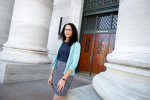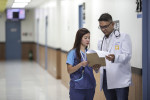Michael Chen ’20 is spending the summer in the Department of Biomedical Informatics lab at Harvard Medical School, where he has worked since he started at the College. The applied math concentrator, who has always been intrigued by the intersection of medicine and technology, published a paper as first author this spring about a computer program he created that can predict drug resistance against a tuberculosis strain in a tenth of a second, and with great precision. The program, which will be made available online for free, is critical in fighting the killer bacteria, which can change form and thus be difficult to properly treat.
“Michael started working on this project with us only as a freshman, and he quickly learned the skills he needed, including coding, statistics, interpreting results,” said Maha Farhat, assistant professor of biomedical informatics at HMS. “What impresses me the most about Michael is his willingness to take on challenges. He also persisted beyond completing the analysis into the peer-review process, which was long and tedious.”
For Chen, a Honolulu resident who has long dreamed of going into medicine and working at the frontier of technology and global health, his many mentors on the project were critical to its success. As part of Isaac Kohane’s lab, he was co-mentored by the lab’s namesake and Farhat. Andrew Beam, a postdoc in the lab who is now an assistant professor at Harvard T.H. Chan School, also advised Chen.
“We were trying to take a more zoomed-out approach to this problem, and my mentors were phenomenal to me. They are all so accomplished, but they still gave me the freedom to do the kinds of analyses I wanted to do. I had my own input into the design of the project,” the 21-year-old Adams House resident said. “They always had time for me, especially in the beginning, and having so many mentors gave me so many ways of looking at problems when they came up.”
Motivated by his and colleagues’ work in the lab, Chen believes their efforts could increase global access to quality health care.
“The impact could be enormous on many people suffering from tuberculosis and other global health threats,” he said. “It’s thrilling to see medical researchers and clinicians collaborate on building technology that can assist physicians, focusing on a truly translational impact.”
When he wasn’t researching TB strains at the Blavatnik Institute at HMS, Chen was getting hands-on experience through Crimson Care Collaborative (CCC), a student-faculty group that provides primary-care services at seven locations in Greater Boston.
“We work as a team with the attending physician, which provided me a valuable opportunity to connect with patients,” said Chen, who works at a site in Revere. “Having that human interaction is something I enjoy and hope to be doing in the future as a physician. I also hope it will be informative for my research. Reflecting on my patient encounters, I find myself thinking, ‘What kind of analyses can I do to help our patients?’
“Electronic health records have been incorporated into many clinics, but it can be a double-edged sword,” he continued. “We can keep track of patient data, but it can hinder physicians because they’re staring at a screen inputting data instead of interacting with the patient. I am always interested in finding ways to mitigate those negative effects.”
Chen currently serves as CCC Revere’s site director, organizing the 30 volunteer undergrads and physician-assistant, nursing, and medical students who work alongside the attending physicians.
In follow-up research he is doing this summer, Chen is studying how more genetic data can be incorporated into his machine-learning programs to achieve higher prediction accuracies. The lab has an expanded dataset of tuberculosis strains for creating a more robust program.
“It’s been quite a process because I didn’t intend to [publish] initially. I didn’t know what the research would turn out to be,” he said. “But when it was all wrapped up, we were excited about our findings and thought we should put it out to the medical and research community.”
Sean Eddy, Chen’s adviser in applied math, said at this point he isn’t sure who is teaching whom. “I don’t know about mentorship. He knows what he’s doing, and I hardly have to do anything except recommend him for fancy honors that he deserves. He’s a remarkably great student.”


